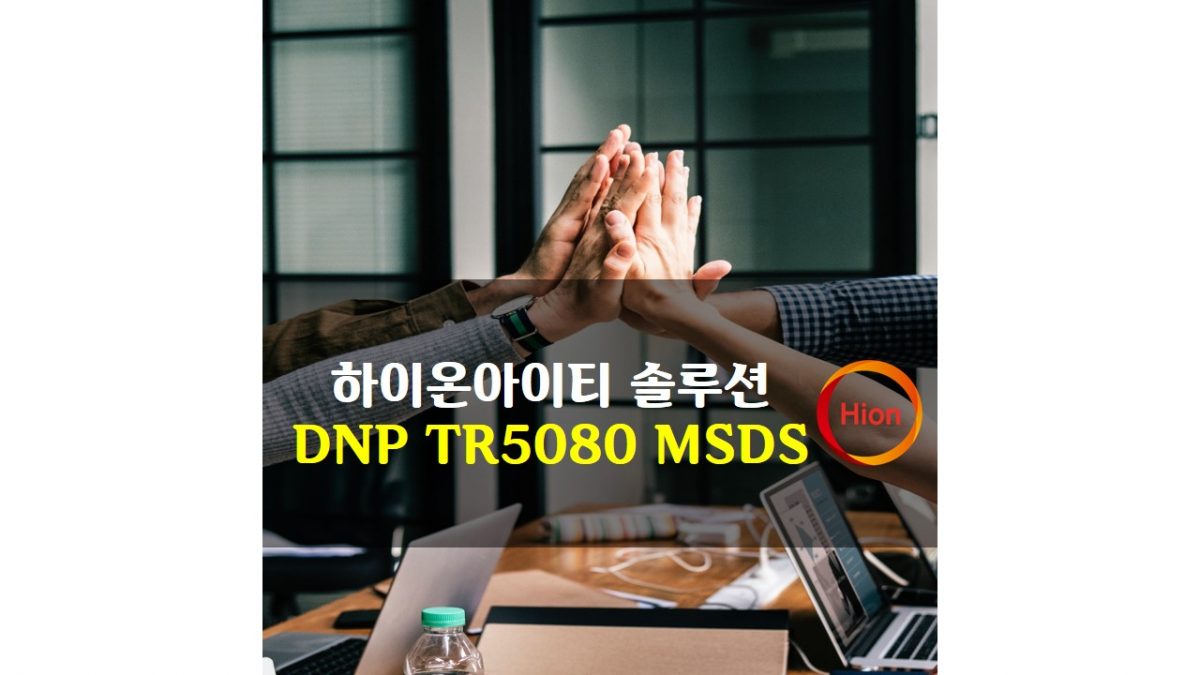CUSTOMER SERVICE
자료실
DNP TR5080 MSDS(Material Safety Data Sheet)

다운로드 (1)
#카테고리1
Material Safety Data Sheet
IDENTITY(As Used on Label and List) - TR5080
Section I
Manufacturer's Name : DAI NIPPON PRINTING CO.,LTD.
Emergency Telephone Number : 04-2952-9666
Telephone Number for information : 04-2952-9666
Date prepared : July 24, 2008
Address : 2-5-1, Hirosedai, Sayama, Saitama, 350-1328 JAPAN
Signature of Preparer (optional)
Section II - Hazardous Ingredients/Identity Information
Hazardous Components (Specific Chemical Identity; Common Name(s)) / OSHA PEL / ACGIH TLV / Other Limits Recommended / %(optional)
Silicone Resin Coated Polyethylene terephthalate film (CAS No. 25038-59-9) / / / / (61~77%)
Coating layer substances
- Carbon Black (CAS No. 1333-86-4) / 3.5mg/m3 / 3.5mg/m3 / None / (6~10%)
- Synthetic resin (Trade secret) / / / / (9~13%)
- Wax (Trade secret) / / / / (9~13%)
- Dispersant (Trade secret) / / / / (0~ 3%)
Section III - Physical / Chemical Characteristic
Boiling Point : Not applicable
Specific Gravity (H2O=1) : Approximately 1.1
Vapor Pressure (mmHg) : Not applicable
Melting Point : Approximately 70℃ (As thermal transfer ink)
Vapor Density (AIR=1) : Not applicable
Evaporation Rate (Butyl Acetate=1) : Negligible
Solubility in water : Negligible
Appearance and Odor : Ink is black solid with slight wax’s odor.
Section IV - Fire and Explosion Hazard Data
Flash point (Method Used) : Not applicable
Flammable Limits : Not applicable
LEL : Not applicable
UEL : Not applicable
Extinguishing Media : CO2, Water, Dry Chemicals, Foam
Special Fire fighting Procedures : For large quantities (i.e. truckload or pallet) involved in a fire, firefighters should wear self-contained breathing apparatus and protective clothing.
Unusual Fire and Explosion Hazards : None
Section V - Reactivity Data
Stability ;
Unstable : Conditions to Avoid : None
Stable : ○
Incompatibility (Materials to Avoid) : Strong acids and strong oxidizing agent.
Hazardous Decomposition or Byproducts : CO,CO2,NOX and H2O etc.
Hazardous Polymerization ;
May Occur : Conditions to Avoid : None
Will Not Occur : ○
Section VI - Health Hazard Data
Route(s) of Entry / Inhalation? / Skin? / Ingestion?
/ No / No / possible but very unusual.
Health Hazards(Acute and Chronic) : All the ingredients are negative mutagenic(Test species ;S. typhimurium)
Carcinogenicity / NTP? / IARC Monographs? / OSHA Regulated?
/ No / Carbon Black : Group 2B / No
In 1996 the International Agency for Research on Cancer (IARC) reevaluated carbon black as a group 2B carcinogen (possible human carcinogen), based upon the development of lung tumors in rats receiving chronic inhalation exposures to free carbon black.
The effects were observed only in animals exposed to high concentrations of carbon black at levels that induce particle overload of the lung.
Studies performed in animal models other than rats have not demonstrated an association between carbon black and lung tumors.
Moreover, a two-year cancer bioassay using a typical toner preparation containing carbon black demonstrated no association between toner exposure and tumor development in rats.
Epidemiology studies of workers in the carbon black producing industries of North America and Western Europe do not demonstrate an association between carbon black and cancer, even in high exposure occupational settings.
In addition, in its reevaluation of carbon black, IARC concluded that “there is inadequate evidence in humans for the carcinogenicity of carbon black.
“Chronic over exposure to many dusts, including carbon black dust, may result in respiratory tract irritation and slight changes in lung function."
Signs and Symptoms of Exposure : None
Medical Conditions : Generally Aggravated by Exposure : None
Emergency and First Aid Procedures : Not applicable
Section VII - Precautions for Safe Handling and Use
Steps to Be Taken in Case Material is Released or Spilled : Not applicable
Waste Disposal Method :
Dispose by the same method of ordinary plastic products in accordance with all applicable regulations.
Any disposal practice must be in compliance with local, state and federal laws and regulations.
If necessary, contact government office and ensure conformity with disposal regulations.
Precautions to Be Taken in Handling and Storing : No special precautions for safety reason.
Other Precautions : None
Section VIII - Control Measures
Respiratory Protection (Specify Type) : Not required
Ventilation ;
Local Exhaust : No
Special : No
Mechanical(General) : No
Other : No
Protective Gloves : Not required
Eye Protection : Not required
Other Protective Clothing or Equipment : None
Work/Hygienic Practices : None
IDENTITY(As Used on Label and List) - TR5080
Section I
Manufacturer's Name : DAI NIPPON PRINTING CO.,LTD.
Emergency Telephone Number : 04-2952-9666
Telephone Number for information : 04-2952-9666
Date prepared : July 24, 2008
Address : 2-5-1, Hirosedai, Sayama, Saitama, 350-1328 JAPAN
Signature of Preparer (optional)
Section II - Hazardous Ingredients/Identity Information
Hazardous Components (Specific Chemical Identity; Common Name(s)) / OSHA PEL / ACGIH TLV / Other Limits Recommended / %(optional)
Silicone Resin Coated Polyethylene terephthalate film (CAS No. 25038-59-9) / / / / (61~77%)
Coating layer substances
- Carbon Black (CAS No. 1333-86-4) / 3.5mg/m3 / 3.5mg/m3 / None / (6~10%)
- Synthetic resin (Trade secret) / / / / (9~13%)
- Wax (Trade secret) / / / / (9~13%)
- Dispersant (Trade secret) / / / / (0~ 3%)
Section III - Physical / Chemical Characteristic
Boiling Point : Not applicable
Specific Gravity (H2O=1) : Approximately 1.1
Vapor Pressure (mmHg) : Not applicable
Melting Point : Approximately 70℃ (As thermal transfer ink)
Vapor Density (AIR=1) : Not applicable
Evaporation Rate (Butyl Acetate=1) : Negligible
Solubility in water : Negligible
Appearance and Odor : Ink is black solid with slight wax’s odor.
Section IV - Fire and Explosion Hazard Data
Flash point (Method Used) : Not applicable
Flammable Limits : Not applicable
LEL : Not applicable
UEL : Not applicable
Extinguishing Media : CO2, Water, Dry Chemicals, Foam
Special Fire fighting Procedures : For large quantities (i.e. truckload or pallet) involved in a fire, firefighters should wear self-contained breathing apparatus and protective clothing.
Unusual Fire and Explosion Hazards : None
Section V - Reactivity Data
Stability ;
Unstable : Conditions to Avoid : None
Stable : ○
Incompatibility (Materials to Avoid) : Strong acids and strong oxidizing agent.
Hazardous Decomposition or Byproducts : CO,CO2,NOX and H2O etc.
Hazardous Polymerization ;
May Occur : Conditions to Avoid : None
Will Not Occur : ○
Section VI - Health Hazard Data
Route(s) of Entry / Inhalation? / Skin? / Ingestion?
/ No / No / possible but very unusual.
Health Hazards(Acute and Chronic) : All the ingredients are negative mutagenic(Test species ;S. typhimurium)
Carcinogenicity / NTP? / IARC Monographs? / OSHA Regulated?
/ No / Carbon Black : Group 2B / No
In 1996 the International Agency for Research on Cancer (IARC) reevaluated carbon black as a group 2B carcinogen (possible human carcinogen), based upon the development of lung tumors in rats receiving chronic inhalation exposures to free carbon black.
The effects were observed only in animals exposed to high concentrations of carbon black at levels that induce particle overload of the lung.
Studies performed in animal models other than rats have not demonstrated an association between carbon black and lung tumors.
Moreover, a two-year cancer bioassay using a typical toner preparation containing carbon black demonstrated no association between toner exposure and tumor development in rats.
Epidemiology studies of workers in the carbon black producing industries of North America and Western Europe do not demonstrate an association between carbon black and cancer, even in high exposure occupational settings.
In addition, in its reevaluation of carbon black, IARC concluded that “there is inadequate evidence in humans for the carcinogenicity of carbon black.
“Chronic over exposure to many dusts, including carbon black dust, may result in respiratory tract irritation and slight changes in lung function."
Signs and Symptoms of Exposure : None
Medical Conditions : Generally Aggravated by Exposure : None
Emergency and First Aid Procedures : Not applicable
Section VII - Precautions for Safe Handling and Use
Steps to Be Taken in Case Material is Released or Spilled : Not applicable
Waste Disposal Method :
Dispose by the same method of ordinary plastic products in accordance with all applicable regulations.
Any disposal practice must be in compliance with local, state and federal laws and regulations.
If necessary, contact government office and ensure conformity with disposal regulations.
Precautions to Be Taken in Handling and Storing : No special precautions for safety reason.
Other Precautions : None
Section VIII - Control Measures
Respiratory Protection (Specify Type) : Not required
Ventilation ;
Local Exhaust : No
Special : No
Mechanical(General) : No
Other : No
Protective Gloves : Not required
Eye Protection : Not required
Other Protective Clothing or Equipment : None
Work/Hygienic Practices : None






